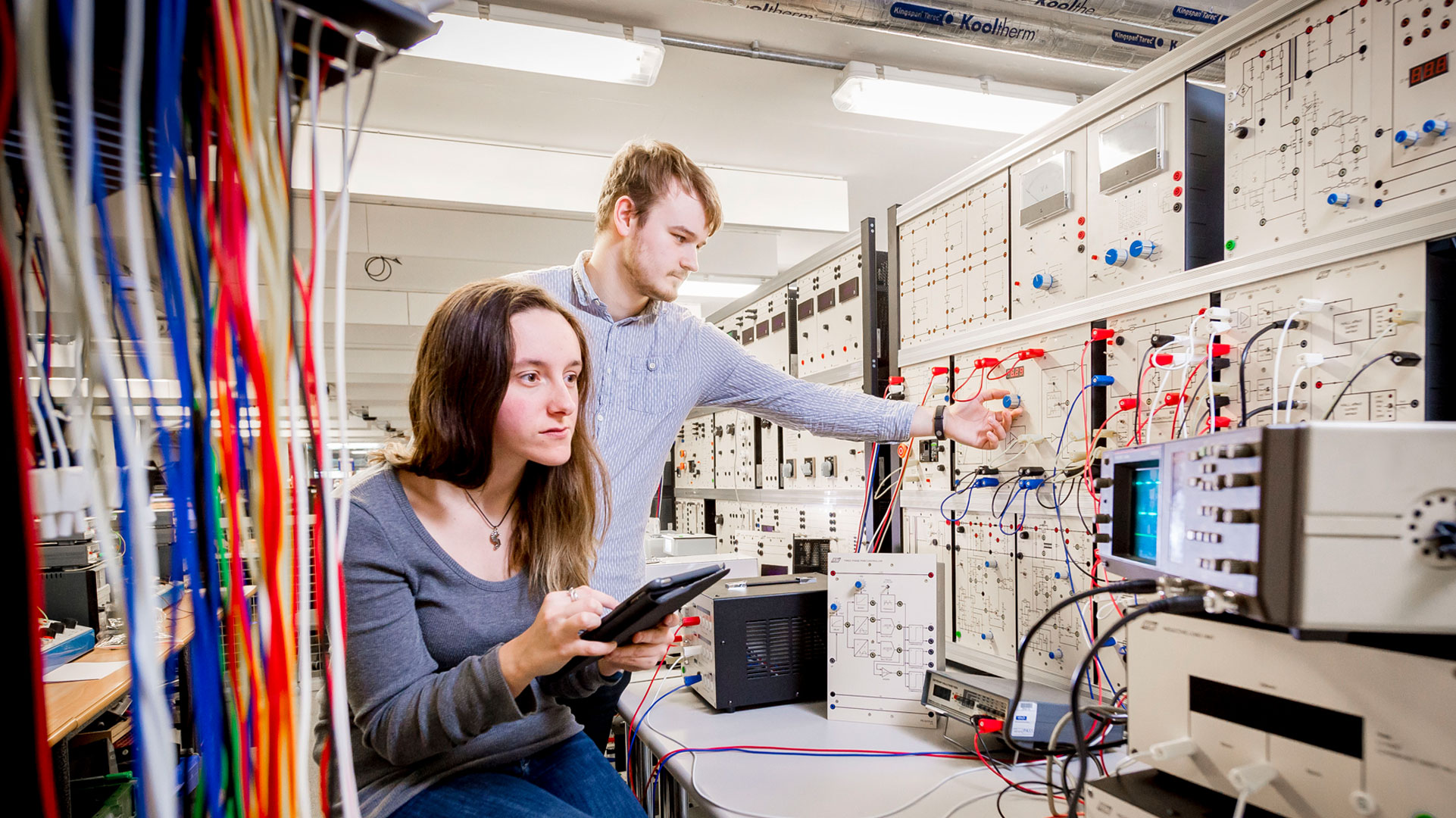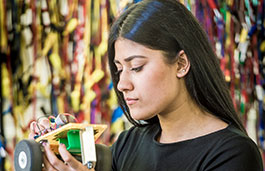Search
Electrical Automotive Engineering MSc
Study level: Postgraduate
Learn the skills needed to design and develop the next generation of electric vehicles. Increase your understanding of automotive engineering and help the industry overcome challenges in automotive electrical systems.
Year of entry
2025-26
Location
Coventry University (Coventry)
Study mode
Full-time
With Professional Placement
Duration
1 year full-time
Up to 2 years full-time with professional placement
Course code
EEST004
Start date
September 2025
November 2025
January 2026
March 2026
May 2026
July 2026
Course overview
This course aims to provide you with a deep and comprehensive understanding of electric and hybrid electric vehicles, preparing you to become a highly sought-after specialist engineer in the electrical automotive engineering market.
This course will help you develop:
- skills in electric power-related areas such as electrical machines and drives, automotive embedded applications and advanced energy storage, covering all aspects of the electric vehicle’s powertrain
- a solid background in vehicular power electronics, signal processing and communications needs and challenges
- technical and managerial skills and expertise, vital to progress into a career in system modelling, BMS design, hardware design and motor design.
5 QS Stars for Teaching and Facilities
QS Stars University RatingsRanked 9th Modern University in UK by the Times
The Times and Sunday Times Good University Guide 2025Ranked 8th for Overall Satisfaction in PTES
Postgraduate Taught Experience Survey (PTES) 2024Why you should study this course
Electric and hybrid electric vehicles represent a rapidly growing field of engineering that is likely to expand significantly in the coming years. Electric vehicles minimise pollution whilst increasing power efficiency. Moreover, areas such as autonomous vehicles and smart transportation grids are beginning to become reality.
Coventry has a rich history in the automotive and transport industries, with Coventry University contributing significantly to advancements in modern transportation. The university has actively participated in numerous projects and collaborations with industry and academia, leveraging its expertise and technical knowledge. Additionally, the Centre for Future Transport and Cities at Coventry University drives research and innovation in clean transportation technologies.
The distinctive features of the programme include:
- learning outcomes delivered by a balance of traditional learning mixed with activity-led and flipped learning. This innovative approach involves you working individually and in groups to undertake project and laboratory work
- incorporating real projects from companies within coursework and projects
- a strong commitment to applied research that encourages you to become involved in research, especially in your individual projects
- being part of a well-organised learning community
- a contemporary and innovative teaching and learning environment offered within the Engineering and Computing building.
You will also have the opportunity to gain practical experience and boost your CV with an additional professional placement. See the modules for more details.2
What you'll study
This course combines theory, simulations and laboratory testing to create an engaging learning environment. It aims to develop a solid foundation in electrical automotive engineering while fostering critical and innovative thinking.
We regularly review our course content, to make it relevant and current for the benefit of our students. For these reasons, course modules may be updated.
How you'll learn
Teaching and learning methods may include:
- lectures
- seminars
- tutorials
- presentations
- group projects
- workshops
- practical laboratory sessions.
Teaching contact hours
As a full-time postgraduate student, you will study modules totalling 180 credits each academic year. A typical 30-credit module requires a total of 300 hours of study. Study hours are made up of teaching contact hours, and guided and independent study.
Teaching hours
Teaching hours may vary, depending on where you are in your studies, but on average you will have between 8 and 12 teaching and learning hours each week. You will also have the opportunity to attend optional sessions including time with a Success Coach or to meet with staff for advice and feedback.
Guided and independent study
Throughout your studies, you will be expected to spend time in guided and independent study to make up the required study hours per module. You will be digging deeper into topics, reviewing what you’ve learnt and completing assignments. This can be completed around your personal commitments. As you progress to the end of your studies, you’ll spend more time on independent learning.
Online learning
As an innovative university, we use different teaching methods, including online tools and emerging technologies. So, some of your teaching hours and assessments may be delivered online.
Assessment
This course will be assessed using a variety of methods which could vary depending upon the module. Assessment methods may include:
- reports
- tests
- essays
- exams
- practical coursework
- assignments
- vivas
- presentations.
The Coventry University assessment strategy aims to ensure that our courses are fairly assessed and allows us to monitor student progression towards achieving the intended learning outcomes.
Entry requirements
Typical entry requirements:
Fees and funding
| Student | Full-time | Part-time |
|---|---|---|
| UK, Ireland*, Channel Islands or Isle of Man | £11,200 £1,500 professional placement fee (if placement secured) |
Not available |
| EU | £11,200 per year with EU Support Bursary** £1,500 professional placement fee (if placement secured) per year with EU Support Bursary** £18,600 per year without EU Support Bursary** £1,800 professional placement fee (if placement secured) per year without EU Support Bursary** |
Not available |
| International | £18,600 £1,800 professional placement fee (if placement secured) |
Not available |
For advice and guidance on tuition fees3 and student loans visit our Postgraduate Finance page and see the university's Tuition Fee and Refund Terms and Conditions.
We offer a range of International scholarships to students all over the world. For more information, visit our International Scholarships page.
Tuition fees cover the cost of your teaching, assessments, facilities and support services. There may be additional costs not covered by this fee such as accommodation and living costs, recommended reading books, stationery, printing and re-assessments should you need them.
The following are additional costs not included in the tuition fees:
- Any optional overseas field trips or visits: £400+ per trip.
- Any costs associated with securing, attending or completing a placement (whether in the UK or abroad).
*Irish student fees
The rights of Irish residents to study in the UK are preserved under the Common Travel Area arrangement. If you are an Irish student and meet the residency criteria, you can study in England, pay the same level of tuition fees as English students and utilise the Tuition Fee Loan.
**EU Support Bursary
Following the UK's exit from the European Union, we are offering financial support to all eligible EU students who wish to study an undergraduate or a postgraduate degree with us full-time. This bursary will be used to offset the cost of your tuition fees to bring them in line with that of UK students. Students studying a degree with a foundation year with us are not eligible for the bursary.
Facilities
Activity-led learning is a key element of this course. Activity-led learning is about providing you with a motivating and rewarding learning experience that will help prepare you for your professional working life. Further details on the facilities and resources, and teaching and learning strategies are provided below.
Electronics laboratories: there are three electronics laboratories with contemporary equipment from top brands in the field such as Tektronix and Keithley and include bench power supplies, multi-meters, signal generators and oscilloscopes. One of these labs contains a large variety of old and new bench equipment allowing you to get experience on a multitude of test and measurement equipment.
Battery laboratory: this is a facility for testing and characterisation of various battery chemistries and supercapacitors for use in EV applications. Using model-based thermal simulations of cells and battery packs with simulation software such as simulink, you can examine how employing various materials, geometric variations and operating temperatures affects a cell's performance.
In-house development board for embedded system: to support activity-led learning, you will use an experimental Peripheral Interface Controller (ePIC ) board developed by the electronics team of Coventry University. The board provides the flexibility of using different microcontrollers with other peripherals such as motors, sensors and LCD screens.
Electrical laboratory: a contemporary lab equipped with high voltage equipment allowing experimentation on topics related to power generation and regulation, motor control and motor investigations of behaviours under load.

Lanchester Library
The library is usually open 24/7, in term-time. It’s where you can access your course’s specialist Academic Liaison Librarian. It’s also home to specialist teams which can support you with your academic writing and maths and statistics questions.

The Hub
The Hub is the centre of student life on campus. Facilities include a food court, convenience store, multi-faith centre, medical centre, hairdresser, coffee shops and the Your SU offices. It has fully licensed function spaces and a bar.

Careers and employability
Get one-on-one career and employability guidance lasting up to 36 months from the end of your course. We’ll help you find placements and graduate roles, offer CV and application checks, mentoring, skills workshops, employer events and more.
Facilities are subject to availability. Access to some facilities (including some teaching and learning spaces) may vary from those advertised and/or may have reduced availability or restrictions where the university is following public authority guidance, decisions or orders.
Careers and opportunities
Successful graduates may seek positions in:
- electric vehicle battery engineering
- automotive electronics engineering
- control systems engineering
- electrical automotive systems engineering
- power electronics and battery engineering
- energy systems engineering
- project engineering/management
- engineering consultancy.
Successful graduates of this course have gone on to work for companies including
- JLR
- Equipmake
- TATA Technologies
- Hall's Electrical Ltd
- Kostal UK
- Leonardo
- EN+
- Coventry University.
How to apply
You may also like

Sustainable Transport Systems MSc






